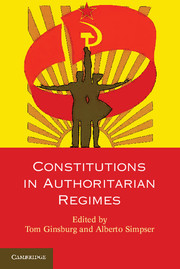Book contents
- Frontmatter
- Contents
- List of Contributors
- 1 Introduction
- Part I The Category
- Part II Constitutional Design in Authoritarian Regimes
- Part III Contents of Authoritarian Constitutions
- Part IV Consequences of Authoritarian Constitutions
- 9 The Role of Presidential Power in Authoritarian Elections
- 10 The Informal Politics of Formal Constitutions
- 11 The Party's Leadership as a Living Constitution in China
- Index
- References
9 - The Role of Presidential Power in Authoritarian Elections
Published online by Cambridge University Press: 05 June 2014
- Frontmatter
- Contents
- List of Contributors
- 1 Introduction
- Part I The Category
- Part II Constitutional Design in Authoritarian Regimes
- Part III Contents of Authoritarian Constitutions
- Part IV Consequences of Authoritarian Constitutions
- 9 The Role of Presidential Power in Authoritarian Elections
- 10 The Informal Politics of Formal Constitutions
- 11 The Party's Leadership as a Living Constitution in China
- Index
- References
Summary
INTRODUCTION
Authoritarian regimes usually operate under an official legal order, either maintaining a past democratic constitution (e.g., the 1935 constitution during Marcos's early years in the Philippines) or creating a new constitution (e.g., Yushin constitution under Park in South Korea). While constitutions in these contexts often are viewed as “shams” or a form of “window dressing,” this may, in fact, not always be the case. Barros (2002) details how the 1980 constitution in Chile – the military's own creation – constrained the junta and ultimately paved the way for the transition to democracy. Albertus and Menaldo (2011), more generally in Latin America, find that some dictators construct greater institutional constraints to their authority through constitutions and, as a result, survive in power longer. In this way, constitutions are another power-sharing device that enables authoritarian leaders and elites to prolong their rule (Myerson 2008; Svolik 2009).
Incumbents, however, are not the only ones influenced by constitutional rules under authoritarianism. Constitutions also shape the strategies of opposition parties when they compete in authoritarian elections. While authoritarian incumbents attempt to use their “menu of manipulation” to ensure electoral victory, opposition parties must decide how best to challenge these regimes (Schedler 2006). One decision parties must make is whether to form preelectoral pacts in an effort to defeat the incumbent (Howard and Roessler 2006; Van de Walle 2006). In the case of presidential elections, coalitions form when several parties agree to support one candidate for the election in exchange for cabinet positions and other political appointments.
- Type
- Chapter
- Information
- Constitutions in Authoritarian Regimes , pp. 199 - 217Publisher: Cambridge University PressPrint publication year: 2013
References
- 2
- Cited by



